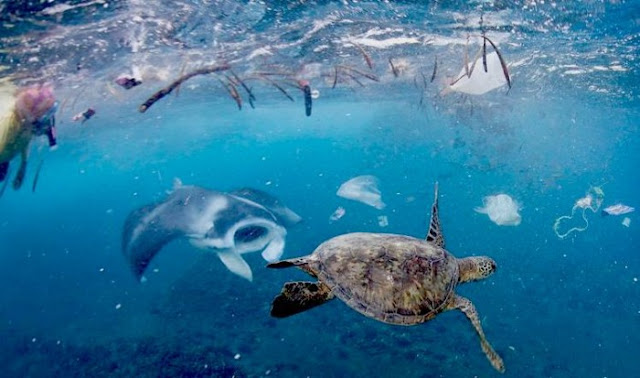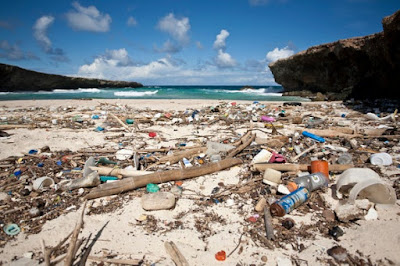"Plastic waste" threatens the safety of marine organisms
Activists through social media sites reported the death of a shark because of plastic waste, and pictures of the material extracted from her belly were published. An accountant named Mohammed Mohammed Salah said: "A young shark died for eating plastic waste. The birds are among the most affected by the millions of tons of plastic waste drawn by the currents of the magnetic gravity of the Earth to the Antarctic. Cleaning the South Pole needs 45 years.
The phenomenon of sea pollution has become a serious issue. An international team of scientists has estimated that five trillion tons of plastic waste is sweeping the world's oceans. The team made these calculations after collecting information from 24 missions between 2007 and 2013. Researchers found that plastic affected marine life near the oceans and seas, estimating that 90 percent of beach birds died for plastic ingestion and found the bodies of swollen turtles The bellies were filled with pieces of plastic, which prevents the digestive tract from functioning, leading to a slow death from starvation.
Greenpeace, the environmental protection organization, discovered plastic waste and toxic chemicals in remote areas of the South Pole in 2018, confirming that the pollution extends to the ends of the planet, noting that it found very small waste of various types of plastic, including shopping bags And tires in nine samples out of 17 water samples collected off the Antarctic coast early in the year. On the other hand, seven of the nine samples taken from Antarctic ice included chemicals used in industrial products that could damage wildlife.
"We may think of Antarctica as a remote wilderness, but from pollution to climate change to the hunting of krill crusts for industrial purposes, the human footprint is clear," says Greenpeace. Remote environments in the Arctic are contaminated with micro-plastic wastes and highly hazardous chemicals. "
UNEP also monitored pollution from plastics from the Arctic to the South Pole and in remote places, including the Mariana Trench, which is the deepest part of the world's oceans, in the Pacific. On this basis, the program called on governments to consider banning or imposing a tax On disposable bags or food packages in order to reduce pollution, especially as 10 percent of the amount of recycled plastic is recycled.
Some 200 countries pledged in December to stop contaminating water with plastic waste on the seas and oceans in a move that could pave the way for a legally binding treaty. UNEP said if pollution rates continue at the same pace, the amount of plastic waste in the sea The number of fish will exceed 2050 by 2020, he said, noting that eight million tons of plastic are received in the ocean each year causing the death of marine organisms, according to Reuters.
The phenomenon of sea pollution has become a serious issue. An international team of scientists has estimated that five trillion tons of plastic waste is sweeping the world's oceans. The team made these calculations after collecting information from 24 missions between 2007 and 2013. Researchers found that plastic affected marine life near the oceans and seas, estimating that 90 percent of beach birds died for plastic ingestion and found the bodies of swollen turtles The bellies were filled with pieces of plastic, which prevents the digestive tract from functioning, leading to a slow death from starvation.
Greenpeace, the environmental protection organization, discovered plastic waste and toxic chemicals in remote areas of the South Pole in 2018, confirming that the pollution extends to the ends of the planet, noting that it found very small waste of various types of plastic, including shopping bags And tires in nine samples out of 17 water samples collected off the Antarctic coast early in the year. On the other hand, seven of the nine samples taken from Antarctic ice included chemicals used in industrial products that could damage wildlife.
"We may think of Antarctica as a remote wilderness, but from pollution to climate change to the hunting of krill crusts for industrial purposes, the human footprint is clear," says Greenpeace. Remote environments in the Arctic are contaminated with micro-plastic wastes and highly hazardous chemicals. "
UNEP also monitored pollution from plastics from the Arctic to the South Pole and in remote places, including the Mariana Trench, which is the deepest part of the world's oceans, in the Pacific. On this basis, the program called on governments to consider banning or imposing a tax On disposable bags or food packages in order to reduce pollution, especially as 10 percent of the amount of recycled plastic is recycled.
Some 200 countries pledged in December to stop contaminating water with plastic waste on the seas and oceans in a move that could pave the way for a legally binding treaty. UNEP said if pollution rates continue at the same pace, the amount of plastic waste in the sea The number of fish will exceed 2050 by 2020, he said, noting that eight million tons of plastic are received in the ocean each year causing the death of marine organisms, according to Reuters.






Aucun commentaire